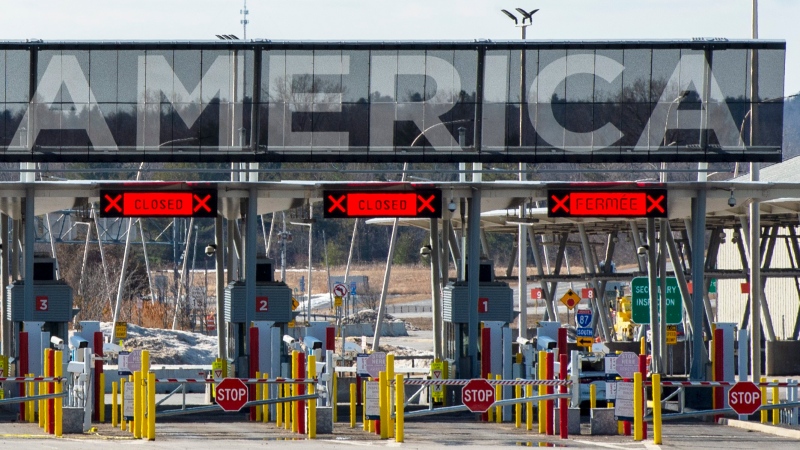

MONTREAL — It’s not just snowbirds with winter homes in Florida who are getting stir-crazy and stressed over the Canada-U.S. border closure.
Before last March, many Quebecers drove across the border by car regularly for a weekend of shopping, camping or simply to get the mail.
Now, stuck for nearly a year without a chance to hit up Plattsburgh, Burlington or any of the other spots they were accustomed to, Canadian and American neighbours on both sides of the border are feeling the loss.
“Pre-COVID, I would cross over the border weekly to do grocery and leisure shopping, in Vermont, Plattsburgh, and North Conway — I really miss it,” said Sabrina Forlini.
“Not only for the excitement of finding new and different stuff that is not sold here in Canada, but the getaway, the freedom to drive and explore another place. Wish things would revert to normal.”
For City of Plattsburgh Mayor Colin Read, the various state, provincal and federal restrictions have hit his community’s tourism and shopping spots “big time,” he told CTV News.
“Not only did we see just lack of tourism come from our neighbours in Quebec, but we just, in general, haven’t seen a lot of people coming to visit us because of the COVID pandemic.”
Even travel within the U.S. south of the border is harder now. Mayor Read said taking the Cumberland Head-Grand Isle ferry to Vermont is more difficult because of isolation mandates.
It’s not just an economic problem, though. For many in Plattsburgh, accustomed to seeing friends and families from either side of the border, it’s been a hard year.
“There’s not only a lack of the economic exchange but also a lack of that cultural exchange that we have grown to appreciate,” Read said.
For many people, cross-border trips weren’t about cheap gas and groceries.
“I still have family and friends living just south of our border,” said Trisha Quinn, who is a permanent Canadian resident originally from Plattsburgh.
Quinn visited her mother every weekend and has not been able to since March 7.
“Going to see her, and being able to visit other friends in the area, was my break from my job as a home daycare provider. It was a way to get completely away from my job and relax,” said Quinn.
“Because of quarantine regulations I can’t go to see her for a weekend and be back to work on the Monday, and I can’t afford to close my daycare for the quarantine period following the return home. I miss her terribly.”
For those with permanent campers, chalets and second homes, the closure has hit the wallet as well as the ability to relax on a weekend.
Barry Goodman has a seasonal travel trailer at a campground in St. Albans, Vermont, and has been going to the spot for over 40 years. He pays about $3,000 in rental fees each year in addition to Vermont state taxes.
“We are very upset. However, we understand the situation and can only hope that we can cross the border without quarantining in the fall,” he said.
“We expect that we will not probably be able to do this, so it is more likely that 2022 is more viable.”
Goodman added that many Canadians in similar situations are either considering selling or have already sold their properties.
The ban applies, as always, to everyone except essential travellers, Canadian citizens, and several other groups who can qualify or apply to cross. But it’s getting even harder to do so. As of Monday, people crossing the land border into Canada are required to show the results of a COVID-19 test.
Negative tests need to have been taken within three days of the scheduled arrival at the border. Those permitted to enter the country can also present a positive COVID-19 test, as long as it was taken 14 to 90 days prior to arriving at the border.
All visitors or returning residents still have to quarantine for 14 days after crossing into the country.
Read said Monday’s new rules did not surprise Plattsburgh’s leaders and that he understands the need to protect citizens on both sides of the 49th parallel, despite the damage done to both economies.
“That’s a balance of saying, ‘Look, we understand,’ as municipal leaders and even as neighbours and some people that are being responsible for each other… that this is going to happen and it’s happening for a good reason,” said Read.
“It is frustrating and I love being in Montreal. I love going to the museums and to the spas, and it’s just not something that’s available right now.”
Read is confident things will change soon and said the local beach will be open in the summer with social distancing and safety measures in place.
“At some point the border will open,” he said.
“And at that point, we’ll get back to some level of normalcy but, you know, from my perspective and from our perspective, we’re not in a rush — we want to do it right. We want to do it measured, and we certainly want to do it safely.”
When that day comes, at least quite a few Montrealers will have goodies waiting for them, assuming they still want them.
Melissa Lemieux is one of the many in Canada who takes advantage of cheaper shipping costs in the States and used to have packages shipped to Malone, New York — including ones she never got to see, when she had to cancel all her road-tripping plans.
“I have items waiting for me to pick them up for almost year,” she said.


